Child Life Specialists Help Patients and Families Cope During Uncertain Times
11.16.2020 | Seattle Children's Press Team
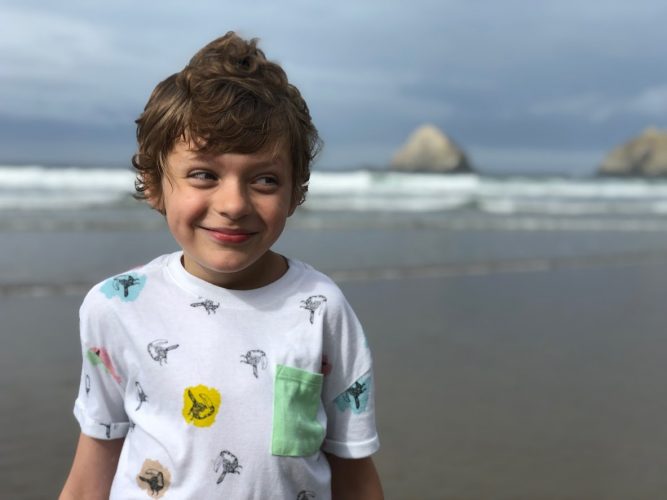
No matter the circumstances outside the walls of the hospital, Seattle Children’s is steadfast in helping every child live the most fulfilling life possible. Although COVID-19 has halted many things in life, health is not one. Compassion and expert care are two infallible aspects that make Seattle Children’s a place families can count on when they need care, and supporting that relentless mission are the incredible health care workers at Seattle Children’s who continue to provide the best, safest care possible for patients and families.
This year, child life specialists at Seattle Children’s have worked tirelessly to try and make the hospital feel like the same inviting and safe place it has always been. They are heroes without capes. Child life specialists help make sure a family’s experience at the hospital is a positive one. As members of the health care team, they work directly with patients and families to help explain a medical diagnosis, create coping plans, teach relaxation techniques, and more.
Walk into the Emergency Department and patients and families will see the bright, welcoming eyes of Riley Coyle. Underneath her mask and face shield, she radiates light. With her warm and inviting personality, she helps patients and families navigate through what can be a traumatic experience. No family hopes to find themselves in the emergency department, but when they do, Coyle is happy to be there with a reassuring hand.
“It’s a huge honor to support our patients and families and be a part of their journey,” Coyle said. “It’s really rewarding, and I try to do anything and everything I can to help them.”
Using creativity to enhance patient experiences
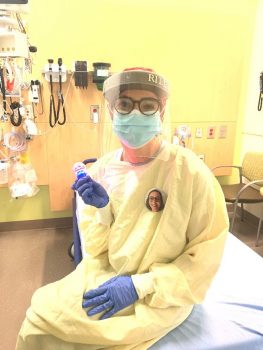 Due to COVID-19, Coyle and her team have needed to get creative with the interventions they use to help patients and families.
Due to COVID-19, Coyle and her team have needed to get creative with the interventions they use to help patients and families.
When a large white tent was erected at the entrance of the emergency department at Seattle Children’s, Coyle and others in the department knew they needed to do something to make it feel more welcoming. They created an I Spy game in the tent to help distract children as they got screened before entering the hospital.
“We knew that would be the first thing patients and families saw when they came to the emergency department, and so we took it upon ourselves to make it more patient-centered,” Coyle said.
For Coyle, those small compassionate touches are meaningful and can all the difference.
“We are truly all in this together,” Coyle said. “We are doing everything we can to make sure patients and families feel safe and as though they are in the best hands possible when they walk into Seattle Children’s. We start with empathizing with what they are going through, first and foremost, and I hope care rooted in that empathy helps families feel supported during this particularly difficult time.”
Coyle said she has a drawer filled with notes and drawings from families and staff that keep her smiling through difficult times. She cares immensely for children and their families, and those notes are reminders of why she works at Seattle Children’s.
Other things child life specialists have implemented in the emergency department include the creation of buttons to help families see the faces behind the masks and protective equipment medical staff wear, infographics to help prepare patients for COVID swabs, and the use of telehealth to support families. One provider in the emergency department even put fish stickers on her face shield to try to make children feel more at ease.
“The thing that makes me love my job so much is being able to meet a child where they are and either diffuse a situation or provide coping skills,” Coyle said. “It makes a difference, in the hospital and beyond. When they leave the hospital, I want them to know they can do hard things. It’s okay to be scared, but they can do it. We believe in them.”
Meeting families where they are
Every child life specialist meets families at different points in the medical journey. Coyle sees patients as they enter the hospital, often during an emergency situation. She also sees families who may receive a diagnosis for the first time. Nancy McCune, a child life specialist in the Surgery Center, meets patients and families prior to surgery.
“We’re here to support the whole family,” McCune said. “Even though they know their child is in good hands, it’s a lot to ask of a parent to leave them to go into surgery. I want families to know we’re going to care for their kids like they are our own.”
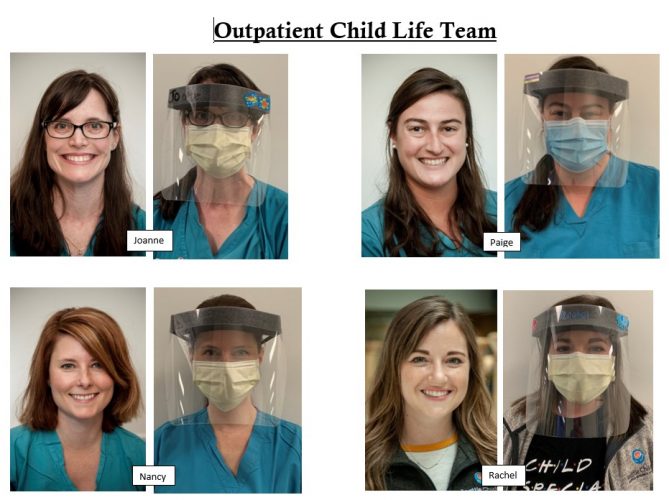
McCune helps patients and families prepare for surgery and incorporates play and coping techniques to help normalize the hospital environment. She says her job hasn’t changed drastically. She and the rest of the child life team still provide the same compassionate care. In response to COVID-19, child life specialists across specialties underwent cross-training and extended their hours in the evenings and weekends to help meet patient needs.
“Now I wear more protective equipment,” she said with a smile. “We understand it must feel strange for families. We’re here to help ensure as many families as possible are receiving child life support and the care they need.”
One of the interventions McCune and her team have implemented to help patients and families feel more connected to the surgical team prior to undergoing surgery is sending packets to families’ homes that show the care team dressed in protective equipment. The goal is for families to be able to see the people behind the gear and to help them prepare for surgery.
Outpatient child life specialists throughout the region and at main campus also collaborated to create a COVID swab preparation booklet. The booklet helps prepare children and families for what to expect when they come to Seattle Children’s for a COVID swab.
More than a hospital
 Heidi Loveall and her husband give their four children ages 12, 10, 8 and 3 an allowance to give to charity. Each year, they individually choose where they want to donate their money. Elijah gives his allowance to the same place every year: Seattle Children’s.
Heidi Loveall and her husband give their four children ages 12, 10, 8 and 3 an allowance to give to charity. Each year, they individually choose where they want to donate their money. Elijah gives his allowance to the same place every year: Seattle Children’s.
“Seattle Children’s is like family,” Loveall said. “They’ve watched Elijah grow from a baby to a toddler, and now he’s a big kid.”
Elijah was diagnosed with intermediate-risk neuroblastoma when he was only 15 months old. For more than nine years, they have been in and out of treatment at Seattle Children’s. Their journey has been long, but Seattle Children’s has been with them since the day they were diagnosed.
The Loveall family lives outside of Olympia, and so they regularly travel to Seattle Children’s for care. Loveall jokes that they travel in a pack – all six of them.
“We’re a troop,” she joked.
Elijah has three brothers and sisters, and they double as his cheering squad. Throughout Elijah’s treatment, they have been by his side, and the team at Seattle Children’s has not just cared for Elijah’s unique needs, but they have supported their whole family.
“We love our hospital,” said Heidi. “It’s an amazing place, and when we say they care, we really mean it. They would move heaven and earth for us.”
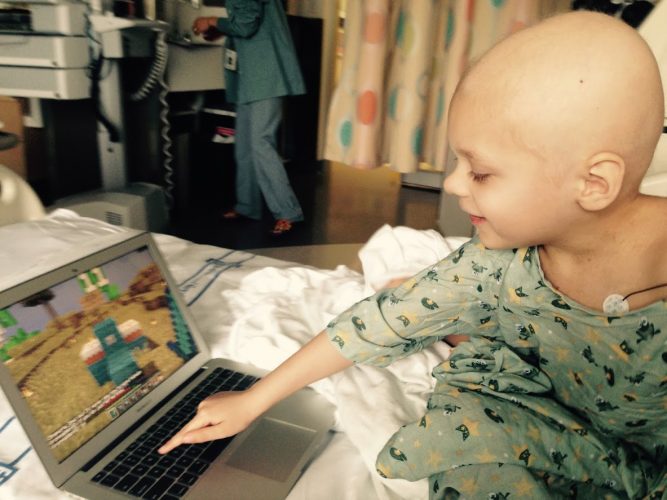
A special place for care
Elijah has been through myriad of treatments for neuroblastoma, including chemotherapy, surgery, radiation, MIBG and several kinds of immunotherapy.
“What gives us hope is our care team and research,” Loveall said. “We have been in this game for a long time. The treatments that Elijah is using now were just a spark of an idea in someone’s head when he was diagnosed. It feels like people are trying, and if anyone can figure this out it’s Seattle Children’s.”
Dr. Navin Pinto and Dr. Julie Park are two of Elijah’s providers who have been fighting in Elijah’s corner for a cure.
Elijah has had many recurrences. At one point, Loveall and her husband remember feeling disappointed, like they were running out of options. Loveall looked at Park and asked her what she would do if she was in their shoes.
“We feel like she treats our kids, but she also loves our kids and cares for them like they are her own,” Loveall said.
Loveall and her family say the hospital is a special place. They have leaned on the compassionate care of child life specialists during their long stays.
“It’s not one thing that makes Seattle Children’s special,” she said. “It’s all the things.”
When Elijah was nervous about getting his port accessed, child life specialists helped develop coping strategies. They used virtual reality to distract him. They helped him feel comfortable attending school, created coping strategies for swallowing pills, and played endlessly with Elijah’s siblings during their long visits prior to COVID-19.
“They really make a difference,” Loveall said. “They are an extra person to be there to think about how they can make my child’s experience better. They’re not just providing great medical care. At Seattle Children’s, they are supporting the whole person.”
Virtual reality and communications help families cope and stay connected
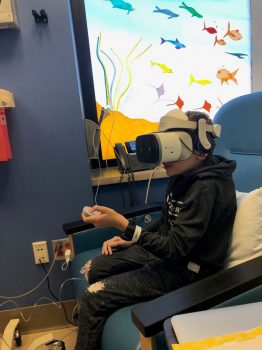 COVID-19 has taken away their family’s ability to be together within the walls of the hospital, but they are still staying connected, albeit virtually.
COVID-19 has taken away their family’s ability to be together within the walls of the hospital, but they are still staying connected, albeit virtually.
Alicia Sevilla is a child life specialist in the Cancer and Blood Disorders Clinic. For Sevilla, the most rewarding part of her job is getting to work with patients and families every day.
Sevilla and her colleagues understand how challenging COVID-19 and the extra precautions at the hospital have made it for families.
“We understand it’s difficult right now,” Sevilla said. “We’re trying to help normalize this experience as much as possible. We’re bridging the gap as best we can. Our mission is to always serve our families. When kids are in the hospital, they are still kids. We’re always here for them, but we also want to be there for their siblings as well.”
To help, child life specialists have created care packages to send home to siblings to make them feel included and connected. The compassion and support child life specialists provide to families doesn’t stop inside the hospital; it extends beyond it.
“It is amazing to see children during these times and how they have such inquisitive minds about what is going on around them,” Sevilla said. She sees the strength and resiliency of the children and their families daily in the clinic.
“We see and care for the patient and whole family during their time here. Often a medical treatment or emergency can be the greatest challenge for a family,” Sevilla said. “We are here to partner with the family and help to navigate these uncharted waters. It is amazing to meet families where they are at in the start of treatment and to be able to support their learning and growth throughout these difficult treatment paths.”
Sevilla said streaming services have been wildly popular. Activities that would have taken place in the playroom have gone digital. Trivia and BINGO are a few favorites. They have also incorporated fun designs on face shields to help make children feel more at ease.
What gives Sevilla hope is knowing kids are in great hands. The hospital experience may feel different, but the same exceptional care is still happening. Sevilla works extensively with the cancer care team. And notes it has been remarkable to see the dedication of the staff during this challenging time.
Finding hope
“We are all in this together,” she said. “Everyone is working tirelessly. Our doctors and researchers remain dedicated to finding cures. Hope is why we’re here. To see families travel here when they are so sick, and take on new treatments and research trials while being separated from their home base support is truly inspiring. Together, we are hope.”
Kids need more than expert care. They also deserve the chance to be a kid, no matter their circumstances. Generous gifts make programs like Child Life possible, in addition to music therapy, art therapy, pet therapy and educational services that provide families with peace of mind and even joy during their most stressful moments
“When kids don’t get the support from our team—through play, art and music, or procedural support—being at the hospital can be a traumatic experience. However, when our team is able to offer developmental play, enrichment, and teaching, children can engage in an experience that allows them to grow and thrive—to live their healthiest life,” said Debbie Kruse, director of Child Life."